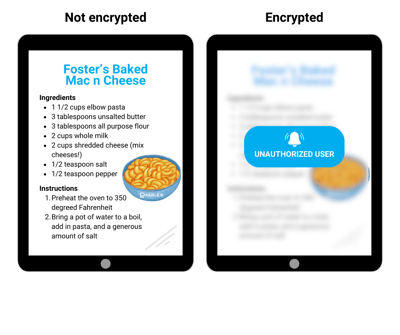
Have you ever left your laptop somewhere by accident? Or even left it on the coffee shop table to go use the rest room? These are some of the common cases in which bad actors get ahold of physical devices, and if it's a company device, the consequences can be detrimental to your organization. But, no one is perfect, so what's the counteraction even IF someone was to gain access to your device? Endpoint encryption is the process of protecting data on devices by encrypting it so that it cannot be read without the correct decryption key. This makes it much more difficult for attackers to steal or misuse sensitive data, even if they are able to gain physical access to the device.
Endpoint encryption is a critical component of any organization's cybersecurity strategy. It can help to protect against a wide range of threats, including:
strategy. It can help to protect against a wide range of threats, including:
- Ransomware: Ransomware is a type of malware that encrypts files on a victim's computer and demands a ransom payment in order to decrypt them. Endpoint encryption can make it much more difficult for ransomware to encrypt files, and can also make it more difficult for attackers to decrypt the files even if they are able to obtain the decryption key.
- Data theft: Endpoint encryption can help to prevent attackers from stealing sensitive data from a device, even if they are able to physically steal the device.
- Insider threats: Endpoint encryption can help to protect against insider threats, such as employees who may intentionally or unintentionally misuse sensitive data.
- Compliance: Many industries are required to comply with data security regulations, such as HIPAA and GDPR. Endpoint encryption can help organizations to demonstrate compliance with these regulations.
- Data loss: Endpoint encryption can help to reduce the risk of data loss due to theft, accidental deletion, or hardware failure.
- Improved data security posture: A strong cybersecurity posture is essential for protecting an organization's data from a wide range of threats. Endpoint encryption is an important part of this posture because it can help to protect sensitive data from being stolen or misused.
- Increased user productivity: Endpoint encryption does not have to slow down users or make it difficult for them to access their data. With a good endpoint encryption solution, users can continue to work as usual without any disruption.
Here are the 5 must-have benefits of endpoint encryption for business
Protects against data breaches
Endpoint encryption makes it much more difficult for attackers to steal sensitive data, even if they are able to gain physical access to the device. This is because the data is encrypted and cannot be read without the decryption key.
According to a study by Ponemon Institute, the average cost of a data breach is $4.45 million. This includes the cost of investigating the breach, notifying affected individuals, and repairing the damage. Endpoint encryption can help to reduce the cost of a data breach by making it more difficult for attackers to steal sensitive data.
Complies with regulations
Many industries are required to comply with data security regulations, such as HIPAA and GDPR. Endpoint encryption can help organizations to demonstrate compliance with these regulations by providing a layer of protection for sensitive data.
HIPAA is a set of regulations that protect the privacy and security of health information. GDPR is a set of regulations that protect the privacy of personal data of individuals within the European Union. Endpoint encryption can help organizations to comply with these regulations by ensuring that sensitive data is encrypted and cannot be accessed without the proper authorization.
information. GDPR is a set of regulations that protect the privacy of personal data of individuals within the European Union. Endpoint encryption can help organizations to comply with these regulations by ensuring that sensitive data is encrypted and cannot be accessed without the proper authorization.
Reduces risk of data loss
Endpoint encryption can help to reduce the risk of data loss due to theft, accidental deletion, or hardware failure. This is because the data is encrypted and cannot be accessed without the decryption key.
According to a study by IBM, the average cost of data loss is $164 per lost or stolen record. Endpoint encryption can help to reduce the risk of data loss by making it more difficult for attackers to access sensitive data.
Improves data security posture
A strong cybersecurity posture is essential for protecting an organization's data from a wide range of threats. Endpoint encryption is an important part of this posture because it can help to protect sensitive data from being stolen or misused.
Increases user productivity
Endpoint encryption does not have to slow down users or make it difficult for them to access their data. With a good endpoint encryption solution, users can continue to work as usual without any disruption.
In fact, some studies have shown that endpoint encryption can actually improve user productivity by reducing the risk of data loss and downtime.
How to choose an endpoint encryption solution
When choosing an endpoint encryption solution, there are a few factors to consider, such as:
- The types of devices that need to be encrypted.
- The level of encryption required.
- The ease of use and management of the solution.
- The cost of the solution.
It is important to choose a solution that is compatible with your organization's devices and applications. The solution should also be easy to use and manage. It is important to consider the cost of the solution as well.
Business use cases for endpoint encryption-1-1.png?width=350&height=341&name=Blog%20Graphics%20(3)-1-1.png)
Endpoint encryption can be used in a variety of business settings, including:
- Financial services: Financial institutions are required to protect sensitive customer data, such as account numbers and Social Security numbers. Endpoint encryption can help to protect this data from being stolen by attackers.
- Healthcare: Healthcare organizations store and process a large amount of sensitive patient data. Endpoint encryption can help to protect this data from being stolen by attackers or lost due to a data breach.
- Government: Government agencies store and process a large amount of sensitive data, such as classified information. Endpoint encryption can help to protect this data from being stolen by attackers or lost due to a data breach.
- Retail: Retailers collect a lot of customer data, such as credit card numbers and addresses. Endpoint encryption can help to protect this data from being stolen by attackers.
- Manufacturing: Manufacturers collect a lot of intellectual property data, such as product designs and blueprints. Endpoint encryption can help to protect this data from being stolen by competitors.
These are just a few of the many business use cases for endpoint encryption. By implementing endpoint encryption, organizations can help to protect their sensitive data from a wide range of threats.
Endpoint encryption is a critical component of any organization's cybersecurity strategy. It can help to protect against a wide range of threats, including ransomware, data theft, and insider threats. By implementing endpoint encryption, organizations can make it much more difficult for attackers to steal or misuse sensitive data.
If you are looking for a way to protect your organization's data from a wide range of threats, endpoint encryption is a must-have security solution. If you're looking for experienced assistance in implementing endpoint encryption to your network, look no further than Charles IT! Reach out to us today to discuss how we can seamlessly implement endpoint encryption without interruption to your team.




